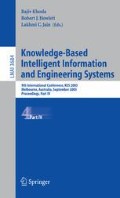Abstract
A tutor’s ability to adapt the tutorial strategy to a student’s emotional and cognitive states is an important factor contributing to the effectiveness of human one-on-one tutoring. Even though tutoring systems were developed with the aim of providing the experience of human one-on-one tutoring to masses of students in an economical way, using learners’ emotional states to adapt tutorial strategies have been ignored until very recently. This paper proposes an initial study to understand how human tutors adapt their teaching strategies based on the affective needs of students. The findings of the study will be used to investigate how these strategies could be incorporated into an existing tutoring system which can then adapt the tutoring environment based on the learner’s affect and cognitive models.
Access this chapter
Tax calculation will be finalised at checkout
Purchases are for personal use only
Preview
Unable to display preview. Download preview PDF.
References
Chi, M.T.H.: Self-explaining Expository Texts: The dual processes of generating inferences and repairing mental models. Advances in Instructional Psychology, 161–238 (2000)
Conati, C., Chabbal, R., Maclaren, H.: A Study on Using Biometric Sensors for Monitoring User Emotions in Educational Games. In: Third Workshop on Affective and Attitude User Modeling, Assessing and Adapting to User Attitudes and Affect: Why, When and How in conjunction with User Modeling (2003)
Conati, C., Zhou, X.: Modeling Students. Emotions from Cognitive Appraisal in Educational Games. In: Cerro, S.A., Gouarderes, G., Paraguacuv, F. (eds.) Proceedings of the International Conference on Intelligent Tutoring Systems, pp. 944–954. Springer, Berlin (2002)
Dalgleish, T., Power, M.J.: Handbook of Cognition and Emotion. John Wiley & Sons Ltd, West Sussex (1999)
Haag, A., Goronzy, S., Schaich, P., Williams, J.: Emotion Recognition Using Biosensors: First Steps towards an Automatic System. In: André, E., Dybkjær, L., Minker, W., Heisterkamp, P., et al. (eds.) ADS 2004. LNCS (LNAI), vol. 3068, pp. 36–48. Springer, Heidelberg (2004)
Koedinger, K.R., Anderson, J.R., Hadley, W.H., Mark, M.A.: Intelligent tutoring goes to school in the big city. International Journal of Artificial Intelligence in Education 8(1), 30–43 (1997)
Marshall, M.: ERM Tutor and ER-to-Relational Mapping Tutor Honours Report, University of Canterbury (2004)
Mitrovic, A., Ohlsson, S.: Evaluation of a Constraint-Based Tutor for a Database Language. International Journal on AIED 10(3-4), 238–256 (1999)
Mitrovic, A., Suraweera, P., Martin, B., Weerasinghe, A.: DB-suite: Experiences with Three Intelligent, Web-based Database Tutors. Journal of Interactive Learning Research (JILR) 15(4), 409–432 (2004)
Ohlsson, S.: Constraint-based Student Modeling. In: Greer, J.E., McCalla, G. (eds.) Proceedings of Student Modeling: The Key to Individualized Knowledge-based Instruction, pp. 167–189. Springer, Heidelberg (1994)
Picard, R.W.: Affective Computing. MIT Press, Cambridge (1997)
Self, J.: Bypassing the intractable problem of student modelling. In: Frasson, C., Gauthier, G. (eds.) Intelligent Tutoring Systems: At the Crossroads of Artificial Intelligence and Education, pp. 107–123. Ablex Publishing Corporation, Norwood
de Vicente, A., Pain, H.: Motivation self-report in ITS. In: Lajoie, S.P., Vivet, M. (eds.) Proceedings of the Ninth World Conference on Artificial Intelligence in Education, pp. 648–650. IOS Press, Amsterdam (1999)
de Vicente, A., Pain, H.: Informing the detection of students. motivational state: An empirical study. In: Cerro, S.A., Gouarderes, G., Paraguacuv, F. (eds.) Proceedings of the International Conference on Intelligent Tutoring Systems, pp. 933–943. Springer, Heidelberg (2002)
Author information
Authors and Affiliations
Editor information
Editors and Affiliations
Rights and permissions
Copyright information
© 2005 Springer-Verlag Berlin Heidelberg
About this paper
Cite this paper
Weerasinghe, A., Mitrovic, A. (2005). Using Affective Leaner States to Enhance Learning. In: Khosla, R., Howlett, R.J., Jain, L.C. (eds) Knowledge-Based Intelligent Information and Engineering Systems. KES 2005. Lecture Notes in Computer Science(), vol 3684. Springer, Berlin, Heidelberg. https://doi.org/10.1007/11554028_65
Download citation
DOI: https://doi.org/10.1007/11554028_65
Publisher Name: Springer, Berlin, Heidelberg
Print ISBN: 978-3-540-28897-8
Online ISBN: 978-3-540-31997-9
eBook Packages: Computer ScienceComputer Science (R0)

